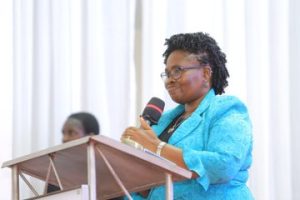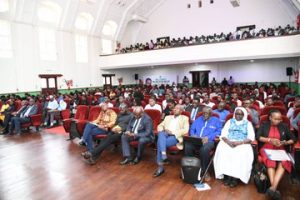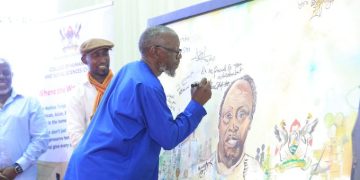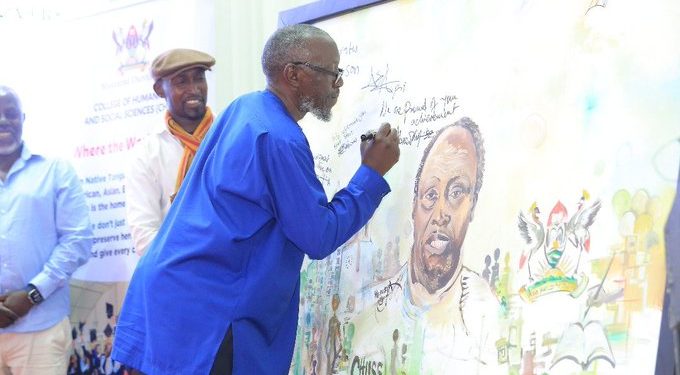The grand Main Hall of Makerere University was draped in solemn dignity and literary pride as scholars, students, and admirers gathered to honour one of Africa’s greatest sons — Prof. Ngũgĩ wa Thiong’o.
The memorial, organised by the College of Humanities and Social Sciences (CHUSS), celebrated the life, legacy, and literary genius of the late Kenyan novelist, playwright, and academic who passed away on May 28, 2025.
Ngũgĩ’s death marked the end of an era in African letters, but at Makerere — the place where his literary journey began — it was a day of remembrance filled with gratitude, poetry, and reflection.
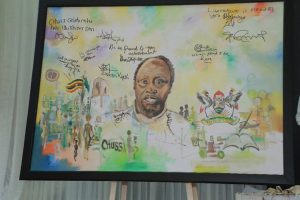
“Makerere’s Own Son”
Representing the Vice Chancellor, Prof. Sarah Ssali, Deputy Vice Chancellor for Academic Affairs, described Ngũgĩ as “Makerere’s own son whose bond with the university even death cannot erase.”
“From our knowledge of Ngũgĩ’s relationship with Makerere, we can claim that he always felt part of this place,” Prof. Ssali said. “He came back several times and often spoke fondly of this hill. He said being part of Makerere made him proud — and we, too, are proud to claim him as one of ours.”
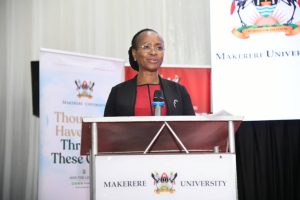
She recalled that Ngũgĩ, then still James Ngugi, first arrived at Makerere in 1959, when it was still known as the University College of East Africa, and spent four transformative years that would shape his career and political consciousness. “He always said that being at Makerere in the 1950s and 1960s was special, and that anyone who missed it could not be consoled, even if they later achieved great things elsewhere.”
Prof. Ssali emphasised that Makerere takes immense pride in having hosted and nurtured the young man who would go on to become one of the most celebrated writers of the 20th and 21st centuries. “We are proud to hold this Memorial Event as an act of respect, but also in recognition of the pride and glory which Ngũgĩ wa Thiong’o brought us,” she said.
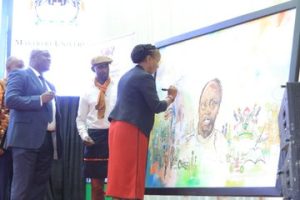
She noted that Ngũgĩ credited Makerere for launching his writing career, a claim he made clear in his memoir “The Birth of a Dream Weaver: A Writer’s Awakening”. “Ngũgĩ made known to the world that his writing career began here,” Prof. Ssali explained. “In his book, he describes Makerere as a place of dreams and awakening — the crucible where his identity as a writer was born.”
She recalled that Ngũgĩ last visited Makerere in 2013, during celebrations marking 50 years of the University of East Africa. “He was so happy to be back here. He made it clear in his keynote speech and even insisted on having a day in his schedule dedicated to visiting his former Department of Literature.”
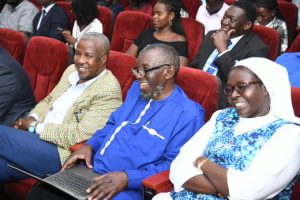
A Voice for Liberation
Prof. Ernest Okello Ogwang, former Deputy Vice Chancellor (Academic Affairs), introduced the keynote speaker (Prof Abasi Kiyimba) with warmth, recalling personal stories that illustrated mentorship and humility. “That kind of humility and friendship is rare—and I thank him sincerely for that.”
Delivering the keynote address, Prof. Abasi Kiyimba, famously known as AK in the corridors of the Literature Department, gave a moving recollection of Ngũgĩ’s life and convictions, painting him as “a man who refused to be silenced by power or fear”.
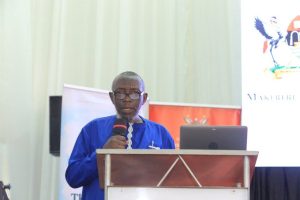
He revisited Ngũgĩ’s arrest and detention in Kenya in the late 1970s, following the staging of his politically charged play “Ngaahika Ndeenda” (I Will Marry When I Want), co-written with Ngũgĩ wa Mĩriĩ.
“Ngũgĩ was arrested and detained without trial in 1977 because his work exposed the injustices of postcolonial Kenya,” Prof. Kiyimba recounted. “When he was released, he emerged stronger — more determined to write in Gikuyu, his mother tongue, as an act of resistance and liberation.”
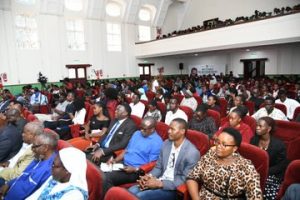
He narrated how Ngũgĩ’s revolutionary stance led to the banning of his books in Kenyan schools, and even contributed to the collapse of the East African Examinations Council, paving the way for Uganda’s own National Examinations Board (UNEB).
“His ideas shook the foundations of the education systems that privileged colonial languages over indigenous expression,” Prof. Kiyimba said. “Ngũgĩ’s life was a testament that language is not just communication — it is identity, culture, and power.”
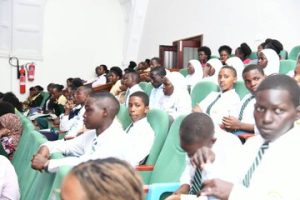
He quoted Ngũgĩ’s famous words: “If you know all other languages and you don’t know your mother tongue, that is enslavement. But if you know your mother tongue, that’s empowerment.”
Prof. Kiyimba praised Ngũgĩ’s lifelong commitment to decolonising the African mind through literature. “He believed that the change of language was a real battle for culture and a reclaiming of dignity — an act of liberation,” he said. “Ngũgĩ’s courage to write in African languages, to translate his own works, and to defend our right to speak for ourselves remains one of the most profound legacies any African writer has left.”
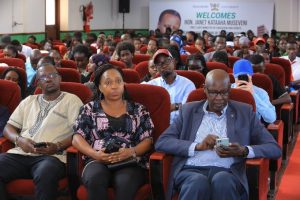
He also recalled how Ngũgĩ often spoke fondly of Lecture Room 4 and the Makerere Main Hall, where he first presented his early works, such as “Weep Not, Child” and “The River Between”, both written while he was an undergraduate. “Makerere was not just a university for Ngũgĩ — it was a home of imagination, a birthplace of dreams,” Prof. Kiyimba said.
Celebrating a Global Luminary
Assoc. Prof. Susan Kiguli, a leading Ugandan poet and scholar, delivered an emotional biographical tribute. She described Ngũgĩ as “one of Makerere University’s most esteemed alumni — a versatile writer, theorist, and activist who profoundly shaped African literary thought.”
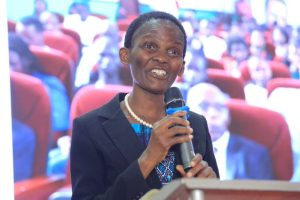
“Ngũgĩ wa Thiong’o gave prominence to the language question in African literatures,” she said. “He urged us to write and dream in our mother tongues. His ideas inspired generations of scholars and writers across the continent.”
Prof. Kiguli highlighted that at the time of his passing, Ngũgĩ was a Distinguished Professor of Comparative Literature and English at the University of California, Irvine, having also taught at Northwestern University, Yale University, and New York University. “He stood as a bridge between worlds — between Africa and the diaspora, between colonial past and postcolonial consciousness,” she said. “His pen carried the pain and pride of Africa.”
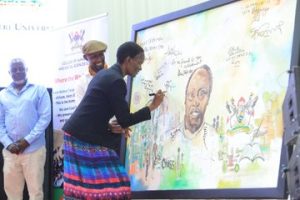
Continuing the Legacy
Prof. Eric Awich Ochen, Associate Professor and Deputy Principal of CHUSS, reaffirmed Makerere’s pride in having been the cradle of Ngũgĩ’s genius. “Ngũgĩ wa Thiong’o’s life will continue to inspire all of us,” he said. “We feel a deep sense of pride and a special attachment to this writer whose talent was famously nurtured here at Makerere.”
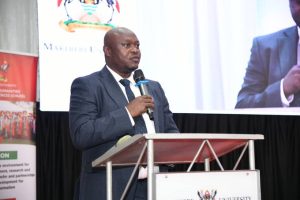
He lauded Ngũgĩ’s fearless spirit and intellectual honesty. “He was a strong advocate for promoting literature in African languages,” Prof. Awich said. “CHUSS is grateful for the legacy he has left behind and for always identifying with Makerere as the place that shaped him. We shall continue to encourage our students to read his works and emulate his determination to stand for what he believed in.”
Dr Levis Mugumya, Acting Dean of the School of Languages, Literature, and Communication, opened the memorial with a message of pride and gratitude. “This is a life well lived,” he said. “Even though we come to remember him and honour his work, we do so with great pride. Ngũgĩ gave prominence to the crucial matter of developing African languages — an issue that our School continues to champion.”
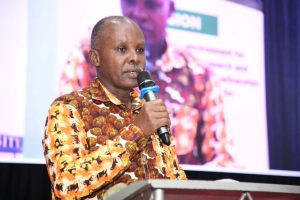
Associate Professor Helen Nambalirwa Nkabala, CHUSS Principal, emphasised that commemorating Ngũgĩ is not merely remembering the past, but sustaining a living legacy of ideas and inspiration. “We are gathered here not just to commemorate a life well lived, but to continue celebrating it — not as something that has ended, but as something still alive among us.”
Prof. Dominica Dipio, Professor of Literature and Film, in her vote of thanks, highlighted Ngũgĩ’s enduring legacy as a storyteller whose name carries the power of memory across generations. “Those of us who are Christians understand this deeply… there is nothing more powerful than a name.”
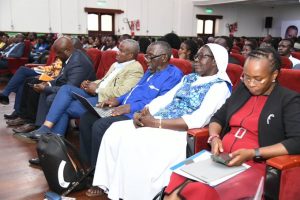
The memorial featured dramatic performances by students from the Department of Literature, reenacting scenes from Ngũgĩ’s plays and novels. As the event drew to a close, Makerere scholars led by Prof. Ssali signed Ngũgĩ’s portrait — a symbolic act of remembrance and gratitude.
